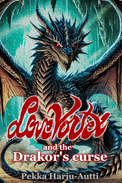
 |
Julius Hawthorne, a renowned ship’s captain in 1751 Glasgow, has faced storms, mutiny, near-starvation, and devastating personal losses in his years at sea. However, none of these experiences have prepared him for the adventure of a lifetime when Duke Thomas Pelham-Holles requests that he voyage to the Andaman Islands to expand Britain’s trading interests. Julius, his son Peter, their cat Michi, and a fifty-man crew set sail on The Heaven’s Voyager to explore this distant land.
Julius encourages his crew through storms and dwindling supplies until they arrive at the captivatingly beautiful islands. Once there, they find the islanders, under the leader Aarav, awaiting their arrival with a warm welcome. The island’s charm and stunning scenery hold a secret: Julius soon learns that each of the islanders has the date of their death tattooed on their foreheads. This is the remnant of a curse placed on them after their ancestors failed to respect the island’s former guardian, the dragon Drakor.
After coming to know some of the islanders’ stories, Julius decides to stay and see if he can find a way to break the curse. He discovers that the foreknowledge of one’s death date has created a monumental impact on island culture and relationships. Julius also learns—both through stories and his own personal experience—that the death date cannot be altered or reversed. A devastating loss propels Julius to find the dragon and break the curse once and for all.
A beautifully crafted historical fantasy, this novel fearlessly explores questions of mortality, the afterlife, and destiny. The story is at once deceptively light and compellingly philosophical, gently pulling the reader into a reflection on life’s deepest struggles. The author poses a unique question: how would having the foreknowledge of one’s death date change not only the person’s life but also their relationships, family structure, and community as a whole? Although similar to the premise of the Final Destination franchise, Chloe Benjamin’s The Immortalists, and Nikki Erlick’s The Measure, the author’s answer to this question is loving and thoughtful, taking into account how an entire societal structure can be formed around the ideas of fate and mortality. It invites the reader to reflect on the treatment of mortality in current society.
While death is often feared in modern culture, in Harju-Autti’s world death is simply a portal to a new state of existence, not to be dreaded but to be accepted. In this book, even children who have an impending death date are taught how to mindfully prepare for death, a reminder of “the value of time and how important it is to use every moment wisely.” Readers are also encouraged to ponder how knowledge of one’s death date could cause disruption within the society, as those with longer lifespans are given more responsibilities and expectations while those with shorter lifespans are given tasks that “bring immediate joy and fulfillment,” thereby creating a divide between the two groups. Both the positive and negative impacts of foreknowledge of one’s death are deeply explored in this book.
Delicately rendered black-and-white drawings are interspersed throughout and skillfully enhance the plot. This unique take on the role of life and death in civilization is a thought-provoking, challenging, and poignant addition to any fantasy reader’s library.
RECOMMENDED by the US Review